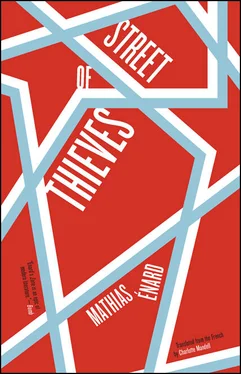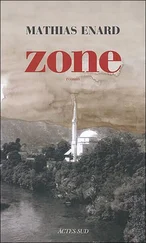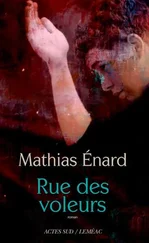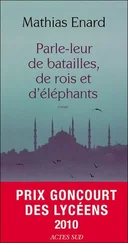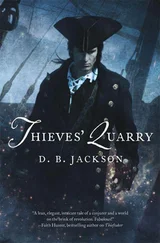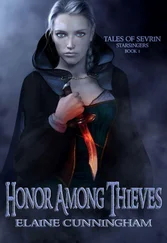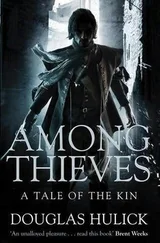PERHAPSit was this long familiarity with corpses that facilitated things; those two months of death made the prospect of robbing Señor Cruz easier to imagine — he had returned as planned after three days, exhausted, he said, by the truck journey into the depths of Morocco. He seemed happy to see me again.
He told me about his trip, which had gone well, he had brought his five corpses to Beni Mellal, all by chance to the same place, it was both practical and horrible. As usual, the women had cried terribly, their wailing had bored into his ears, the men had dug the graves, and that was it. He had only enough time to stop in Casa for a night to pig out, he said these words with such sadness in his reedy voice, pig out, that it could just have easily have been referring to his last meal.
Cruz poured himself some whiskey.
He had me sit down across from him in an armchair, offered me a drink, which I refused.
He said nothing, the whole scene seemed to call for conversation, confidences, but he was silent; he drank his Cutty Sark, glancing at me from time to time, and I felt more and more nervous.
I tried to speak, to ask questions about his trip to Morocco, but when he replied his answers were monosyllabic.
He finished his drink and politely offered me another before helping himself again.
After an endless quarter of an hour of silence, which I spent looking in turn at my knees and at his impassive face, I left, asking him to excuse me, I had to feed the dogs; he motioned with his head, accompanied with a brief smile.
Once in the yard I breathed a sigh of relief, I was trembling like a frail thing. Through the window, I saw Cruz’s fat face, haloed by the electric blue of the computer screen, resume his stupefied contemplation of the forms of death.
I felt in danger; fear overcame me, powerful, irrational; I went to kneel down with the mutts, their muzzles nosed into my armpits, the softness of their fur and their clear gaze comforted me a little.
CRUZalways seemed to be hovering on the verge of speech.
I had never encountered madness before, if Cruz was mad — he didn’t launch into unreasonable diatribes, didn’t bang his head against the walls, didn’t eat his excrement, wasn’t overcome with delirium or visions; he lived in the screen, and in the screen, there were terrible images — old photos of Chinese tortures where men bled, attached to posts, their chests cut open, their limbs amputated by executioners with long knives; Afghan and Bosnian decapitations; stonings, stomachs ripped open, defenestrations, and countless war reports — strange, I thought, fiction is much better filmed, much more realistic than documentaries or the photos from the beginning of the century, and I wondered why, above all, Cruz always looked for the mention of “reality” in his pictures; he wanted the truth, but what difference could it make: he had his storage room full of corpses, he knew them intimately, he had frequented them for years, and I still wonder today what could have motivated this pathological virtual observation, he should have been cured of death yet he was gorging on miles of scenes of tortures and massacres. What was he looking for, an answer to his questions, to the questions the stiffs didn’t answer, a questioning about the moment of death, the instant of passage, perhaps? — or perhaps he had simply been engulfed by the image, the bodies had made him leave reality and so he was burrowing into cyber-reality to find there, in vain, something of life.
As the days went by, he frightened me more and more, for no reason — he was the most inoffensive of creatures; he was gentle with me, gentle with his dogs, respectful of the dead. Every day I thought about asking him for my passport and up and leaving, too bad about the cash, farewell Mr. Cruz, the drowned and the bluish light of tortures on YouTube, come what may — but every night, in my cubbyhole, reassured by the company of the dogs, by the softness of their fur, by their panting calm, I would resume my dreams of theft, of the two or three thousand euros that Cruz’s safe might deliver to me. I had sketched out a plan, one of those schemes that only work in books, until you try them: go into town to buy a similar key, it might be a common model, and substitute it on the key ring, which he often left in the entryway — of course the new key wouldn’t open the safe, but when he realized it, with a little luck I’d be far away.
All the corpses I washed and put into their boxes justified my petty theft, I thought — but Mr. Cruz had an honest profession, he wasn’t killing these poor people himself, he was charitable, he didn’t bleed the families of the deceased, his prey was the State, the autonomous Community of Andalusia that paid his per diem for the carcasses of my compatriots, but all the riches I saw him accumulating, his gold rings, the chains around his neck, his black shirts, his car, his two huskies with their blue eyes in the sheltering shade of his creeping vines, all that seemed to me to be stolen from the Dead, seemed to belong to those nameless stiffs who had dreamed for a while of a better life, who had thought, like me, that they could make themselves a place in the world, and out of respect for this dream I thought I could appropriate some of his cash, as a little revenge for these poor martyrs who had known the pangs of drowning, experienced agony in the black solitude of the waves.
The more my determination increased, the more the possibility of putting my thoughts into action kept me awake at night; how could I get hold of the key to the safe, when should I run away, how — I had to go by foot to the bus stop, three hundred meters away, and I had to await the pleasure of the very erratic Andalusian intercity transportation system. That’s when I would be most vulnerable, just like in novels. Books and prisons were full of guys who made huge blunders and who were nabbed without any difficulty whatsoever, just like that, at a bus stop or a sidewalk café. That wouldn’t be my way. The bus, the bus station, the 11 PM coach, and the next day I’d be in Barcelona, lost in the crowd.
I couldn’t make up my mind to act. Cruz was hypnotized by the Internet more and more; he stayed late, sometimes till ten at night, exploring videos — he had discovered a site called faces of death where hundreds of violent deaths could be found: a young Iranian demonstrator killed by the forces of order, Egyptian revolutionaries beaten to death by the police, Libyan soldiers burned alive in their Jeep, Syrian children massacred — current events filled the Internet with documents for Cruz.
One particularly dark day, the Strait vomited up an old, very damaged corpse that people walking on the beach had discovered — the judge visited, gave notice that this detritus on the sand could be chucked, the pathologist concluded death by drowning, and Cruz rushed there with his hearse to take charge of the remains before any of the competition: it was very sad and very gruesome, the guy had tattooed “Selma” in Arabic over his heart, that’s all that could be used to identify him: he no longer had a face, at least nothing recognizable, and we quickly, very quickly closed him up in his zinc box so as not to see him anymore. Señor Cruz threw on his rubber gloves, then his mask; he had a little tear in the corner of his right eye, which he erased by rubbing his face against his bicep, arm outstretched. He sighed, turned toward me, without saying anything, he crossed the yard to walk to my hut, the dogs followed him wagging their tails, thinking he wanted to play or give them some food; he re-emerged from the garden shed holding a bottle, I wondered if he had hidden a liter of Scotch there without my ever noticing it, but the container looked smaller than his eternal Cutty Sark. He made a sign to me to follow him into the office; he said in his tiny voice:
Читать дальше
